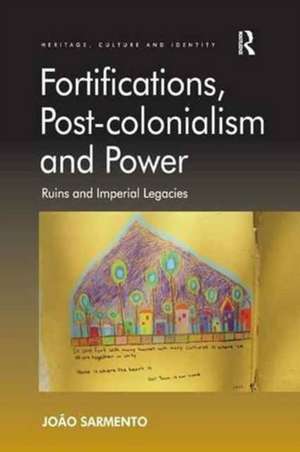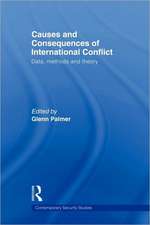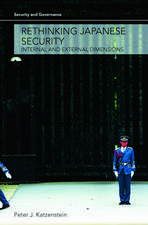Fortifications, Post-colonialism and Power: Ruins and Imperial Legacies
Autor João Sarmentoen Limba Engleză Paperback – 23 noi 2016
| Toate formatele și edițiile | Preț | Express |
|---|---|---|
| Paperback (1) | 469.34 lei 6-8 săpt. | |
| Taylor & Francis – 23 noi 2016 | 469.34 lei 6-8 săpt. | |
| Hardback (1) | 1053.79 lei 6-8 săpt. | |
| Taylor & Francis – 18 noi 2011 | 1053.79 lei 6-8 săpt. |
Preț: 469.34 lei
Nou
Puncte Express: 704
Preț estimativ în valută:
89.81€ • 97.86$ • 75.68£
89.81€ • 97.86$ • 75.68£
Carte tipărită la comandă
Livrare economică 23 aprilie-07 mai
Preluare comenzi: 021 569.72.76
Specificații
ISBN-13: 9781138260672
ISBN-10: 1138260673
Pagini: 176
Dimensiuni: 156 x 234 mm
Greutate: 0.45 kg
Ediția:1
Editura: Taylor & Francis
Colecția Routledge
Locul publicării:Oxford, United Kingdom
ISBN-10: 1138260673
Pagini: 176
Dimensiuni: 156 x 234 mm
Greutate: 0.45 kg
Ediția:1
Editura: Taylor & Francis
Colecția Routledge
Locul publicării:Oxford, United Kingdom
Notă biografică
João Sarmento is an Assistant Professor at the Geography Department, University of Minho, Guimarães, Portugal and Researcher at the Centre for Geographical Studies, University of Lisbon, Portugal ('Tourism, Culture and Space' Group).
Recenzii
'João Sarmento is a fantastic story-teller. This book is well written and presents in a very pleasant form an original excursion into the complexities of postcolonial geographies. Proceeding with much finesse, João Sarmento presents a fascinating analysis of the postcolonial geographies that tourism and Western Capitalism are building all over the World.' Paul Claval, Université de Paris-Sorbonne, France 'This book takes an exciting tour around fortifications and settlements comprising a Portguese "archipelago of empire", one with global reach but here explored chiefly in its African context. Juxtaposing archival research and ethnographic encounter, the author unfolds a bewildering set of entangled tales about imperialists, navigators, pirates, slaves, tourists, architects, planners, dictators and enterpreneurs, in which the ruins of old (geo-political) empires become reworked through the deeply tragic follies of new (geo-economic) "empires". The book is also about memory - about forgetting, celebrating and inventing - where it is the crucial silences of today's fort-as-museum that are arguably the most instructive. Furthermore, the book serves as a challenging mediation on key failures of the postcolonial, and on how a postcolonial geography might now respond.' Chris Philo, University of Glasgow, UK 'This is a very welcome contribution to the debate on the spatialities of the postcolonial. Concerned with the material and immaterial cultural geographies of Empire, Sarmento shows how Portuguese fortifications across three continents today represent an intriguing and complicated heritage which well deserves this brilliant investigation. A rewarding read.' Claudio Minca, Wageningen University, The Netherlands and Royal Holloway, University of London, UK 'Overall the text is a successful initial foray into the significance of fortifications within Africa and their role in aiding an understanding of the perpetuation of colonialist ways of seeing, providing an in-d
Cuprins
Chapter 1 Ruins and Imperial Legacies: Global Geographies of Portuguese-built Forts; Chapter 2 Portugal’s ‘Weekend at the Coast’: Fort Jesus and Empire Celebration in Kenya; Chapter 3 1An earlier version of this chapter was published in Tourism Geographies, 2010, 12(2): 246–63 with the title ‘Fort Jesus: Guiding the past and contesting the present in Kenya’. I acknowledge the permission to reprint from the publisher (Taylor & Francis Ltd, http://www.tandf.co.uk/journals); Chapter 4 1An earlier version of this chapter was published in Social and Cultural Geography, 2009, 10(5): 523–44 with the title ‘A sweet and amnesic present: the postcolonial landscape and memory makings in Cape Verde’. I acknowledge the permission to reprint from the publisher (Taylor & Francis Ltd, http://www.tandf.co.uk/journals); Chapter 5 A Neglected Trophy, Elusive Oil and Re-workings of Memory in São Tomé e Príncipe; Chapter 6 In the Shadows of Mazagan: The Medina of Azamour, Morocco; Chapter 7 Conclusions;
Descriere
By critically examining Portuguese fortiifications across the former Lusophone empire, this book constructs a cultural and political geography that informs our understandings of the performance of the 'colonial present', it investigates how memory attaches itself to places and discusses how contemporary postcolonial states resolve the ambiguous public treatment of colonialism and the 'colonial present. This book also provides an understanding of the role of various imperial legacies in the construction of memory and identity and explores the intersection of colonialism, memory, power and space in the postcolonial Lusophone world.
















